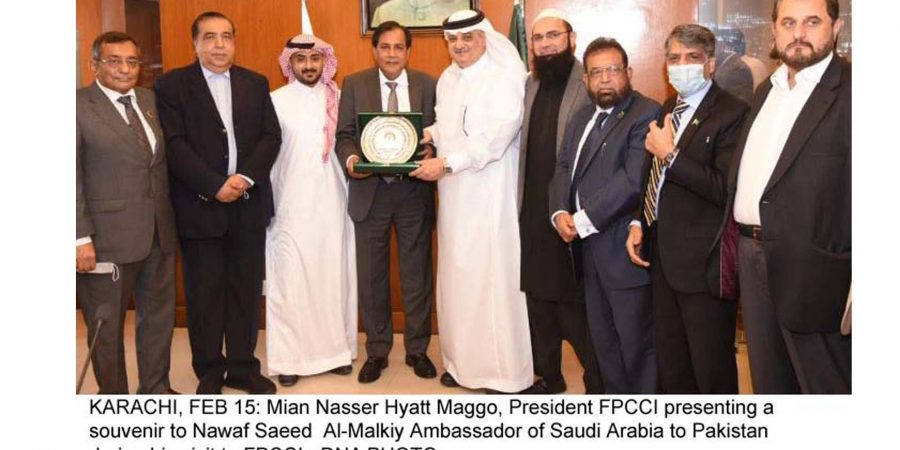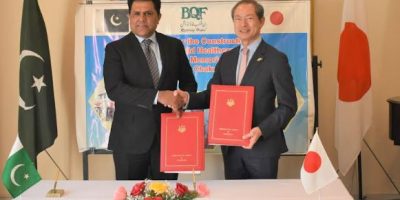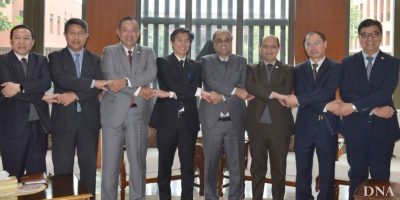Pakistan has strong strategic, diplomatic relations with Saudi Arabia: President FPCCI

KARACHI, FEB 15 (DNA) – Pakistan has strong strategic, diplomatic and economic relations with Saudi Arabia and Pakistan cannot forget the financial assistance of Saudi Arabia in the form of oil, construction of educational institutions and on Kashmir cause; this was stated by Mian Nasser Hyatt Maggo, President of the Federation of Pakistan Chambers of Commerce and Industry (FPCCI) in a meeting with Nawaf bin Said Al-Malki, Ambassador of Saudi Arabia in Pakistan who visited FPCCI along with Nahar Abdulaziz Almugbel, Commercial Attache of Saudi Arabia.
The meeting was attended by Vice Presidents FPCCI Mr. Athar Sultan Chawla and Mr. Hanif Lakhani, Mr. Zakaria Usman, Former President FPCCI, Mr. Junaid Ismail Makda, Chairman Pakistan Saudi Arabia Business Council and members of the Business Council.
While welcoming the Ambassador, Mian Nasser Hyatt Maggo, President FPCCI stated that Saudi Arabia is an important trading partner of Pakistan but there is no trade agreement between two countries and trade between both countries held on the basis of MFN tariff rate applied to all members of WTO. While quoting the statistics, he informed that the share of Pakistan in Saudi Arabia’s trade is just 1 percent; while in Pakistan’s trade is approximately 7 percent.
The reason for this minuscule share is mainly unawareness, and a non-aggressive marketing of Pakistani products. He emphasized on the activation of Joint Business Council between two countries whose agreement was signed in 2000 and since then, only three meetings were organized. He also underlined the need of exchange of delegations, holding of B2B meetings and exhibitions.
In his remarks, H.E. Nawaf bin Said Al-Malki, Ambassador of Saudi Arabia underscored the need of removal of trade barriers and promotion of trade through direct route.
He stated that Pakistan and Saudi Arabia both posses huge natural resources which can be utilized for enhancement of bilateral relations. He also informed that there is huge potential in rice, textile, sea food, sports goods, agro-based products and there is a need of direct interaction between the traders of both countries in these commodities. Mr. Nahar Abdulaziz Almugbel, Commercial Attache of Saudi Arabia also emphasized on the enhancement of bilateral trades and investment.
Mr. Junaid Ismail Makda, Chairman Pakistan Saudi Arabia Business Council also highlighted the trade potentials and focused on person to person interaction between countries for enhancement of bilateral trade. He also emphasized on activation of Joint Business Councils and exchange of delegations. Mr. Athar Sultan Chawla, Vice President FPCCI discussed holding of exhibitions and PR campaign in Saudi Arabia for soft and peaceful image of Pakistan. He also suggested opening of Saudi Arabia EXIM bank branch in Pakistan for trade facilitation. Mr. Hanif Lakhani, Vice President highlighted the potentials of bilateral trade in textile sector.
During the meeting, the members of Pakistan Saudi Arabia Business Council also highlighted the issues related to imposition of ban on exports of shrimps from Pakistan.
The members also requested for enhancing the share of Pakistani basmati rice as Pakistan contributes just 10 percent in overall imports of Saudi Arabia rice while remaining 90% Saudi Arabia is importing from India and Thailand. The members also requested multiple entry visa to genuine businessmen on the recommendation of FPCCI within shortest possible time.
The members also suggested holding of Biryani Festival regularly in Saudi Arabia and enhancement of overseas employment for Pakistani workers in Saudi Arabia on the same terms and condition prior to COVID-19.=DNA
===================
Related News

Japan funds healthcare, road projects in Chakwal & Mansehra
ISLAMABAD, FEB 3 /DNA/ – The Government of Japan, under its Grant Assistance for GrassrootsRead More

Thailand hands over the ASEAN Committee chairmanship to Indonesia
H.E. Lt. Gen. (Rtd.) Chandra Warsenanto Sukotjo, Ambassador of Indonesia to Pakistan, assumed the roleRead More


Comments are Closed